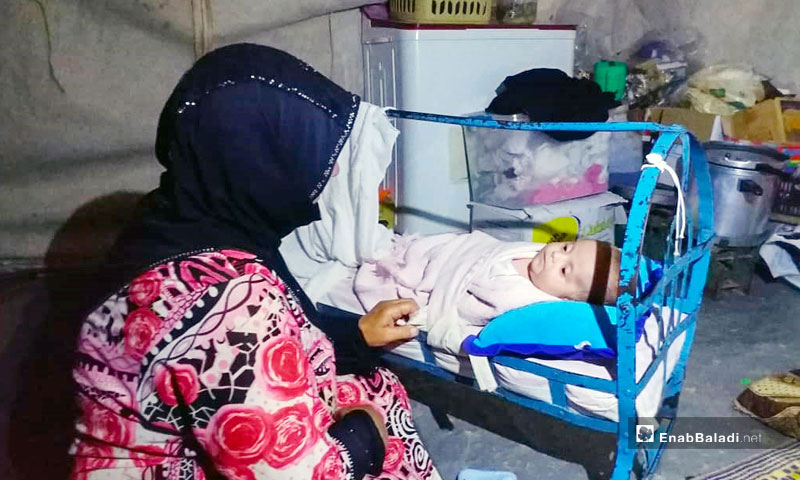Enab Baladi – Mays Shetyan
“My child was delivered prematurely because of the fatigue of displacement and lack of medical care.” With these words Um Maryam described her suffering during pregnancy, which did not stop there, but continued until after birth, as her premature childbirth resulted in her baby girl’s need for an incubator, which was made available too late for the toddler, causing her a brain damage.
Um Maryam was forced to move with her family from Kafr Nabl, along with about 380,000 people from the southern and eastern Idlib countryside, from November 1, 2019, to January 8, according to the Syrian Response Coordination team’s statistics.
Um Maryam, who is currently living in the Qalaa camp near Sarmada in Idlib countryside, explained to Enab Baladi the circumstances of her childbirth, as she got a pregnancy allergy, the flu and severe diarrhea due to the harsh living conditions in the camp. Eventually, Um Maryam went into premature labor, during which she suffered greatly before the arrival of an ambulance to transport her to the nearest medical center.
After birth, the child needed an incubator because she was born prematurely. Thus, the family could not manage to secure the necessary medical care in time, which caused the child to suffer from brain damage. Today, the toddler needs surgery and medical follow-up, while the nearest hospital is 25 kilometers away from the camp.
Um Maryam is not the only cause, as many women in the camps are exposed to problems during pregnancy, and they fear, as they told Balab Baladi, the risk of premature birth in the absence of medical services and the lack of necessary care.
The role of Idlib Health Directorate in providing pregnant women with necessary medical care
The region is undergoing a major shortage of medical staff, as many medical centers and hospitals were shut down due to the bombing. Thus, the most recent incident took place in Marrat al-Numan, as the area’s Central Hospital and its clinics went out of service on January 8.
Reproductive health official in the Idlib Health Directorate, Batoul Khedr, explained to Enab Baladi that the main problem lies in the lack of medical staff, the difficulty facing the camp residents to reach properly equipped health centers and the limited access to medicines and nutritional supplements necessary for pregnant women, in addition to the spread of many diseases among women such as sexually transmitted diseases.
Khedr indicated that the rate of cesarean sections (C-sections), according to the latest statistic in 2019, reached 30 percent of the birth rate in the whole province. As such, the cost of a C-section in private hospitals ranges between 80,000 and 90,000 Syrian pounds, while normal delivery costs between 40,000 and 50,000 (one dollar is equal to 900 Syrian pounds approximately).
She also stated that the number of medical centers and hospitals specializing in obstetrics, gynecology, and pediatrics decreased from 51 to 23, located in various areas of the governorate, as following the latest bombing, many hospitals were shut down. On the other hand, the directorate opened 50 mobile clinics, which are visiting the camps to provide health care for women, children, and sick people.
In a report issued on January 5, the Syrian Network for Human Rights (SNHR) documented that 98 medical facilities were out of service in 2019 due to the shelling.
Training for midwives
The Idlib Health Directorate launched several training workshops to legally qualify and graduate midwives, who are able to cover staff shortages in obstetrics and gynecology.
The Idlib Health Directorate also conducted a training session to qualify midwives for the first time in Idlib, on November 24, 2019, under the title “Basics of life support in Obstetrics”, which was designated to train 21 legal midwives.
Khedr confirmed that the directorate continues to organize this training, aiming to include the villages and areas of Idlib countryside.
The training department at Idlib Health Directorate, Dr. Aisha Idris, told Enab Baladi that the aim of the course is to train midwives to perform first aid in obstetrics, such as resuscitation of the newborn, managing dangerous cases during and after childbirth, and reducing the number of C-sections cesarean sections, thus reducing the death rate.
With the increasing number of displaced people, continued shelling and high death tolls, as well as the deteriorating humanitarian and health conditions in the area, the United Nations reiterated warnings about the alarming situation.
Mark Cutts, Deputy Regional Humanitarian Coordinator for the Syria Crisis, expressed on January 7, his concern over the deteriorating situation in Idlib Governorate, with the increasing numbers of displaced people and the continued bombing and killings, describing what the region is going through as real “nightmare”.
Cutts noted that the displacement phenomenon coincided with lower temperatures, while many displaced people are forced to live in camps and random shelters in uninhabitable places, leaving them exposed to harsh weather conditions.











